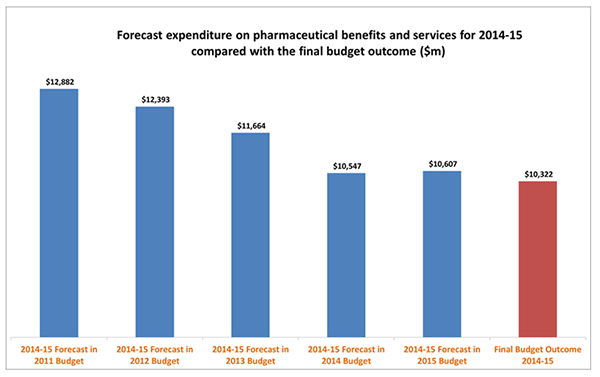PBS medicines save $7 Billion in Hospital Costs
A new report has found that investing in new medicines pays for itself by reducing other public health expenditure. The modelling, published in The impact of pharmaceutical innovation on premature mortality, hospital separations, and cancer survival in Australia, was conducted by American economist Professor Frank Lichtenberg.
Medicines Australia CEO Tim James said, “This comprehensive study shows that taxpayers and patients are getting value for money from government investment in the PBS.”
“The report clearly demonstrates that the PBS is highly cost effective and also reduces health expenditure across our hospitals.”
The report estimates that innovative medicines saved taxpayers almost $7 billion in hospital costs for people up to 80 years of age in 2011 – more than the cost of reimbursing these medicines through the PBS.
“Premature mortality for all diseases fell by 24% in Australia between 1998 and 2011 and around 60% of this can be attributed to innovative medicines,” Professor Lichtenberg said.
“This research estimates that innovative medicines saved over 140,000 years of life before the age of 75 in Australia in 2011”.
According to the report, innovative medicines which were first listed on the PBS between 1989 and 2002 cost $5.8 billion in 2011. This period is used because once an innovative medicine is listed on the PBS it takes nine years for it to reach peak usage.
“Without these medicines, the cost of hospitalisation in 2011 would have been 13% or $6.8 billion higher”, said Professor Lichtenberg.
“This modelling identifies that listing innovative medicines on the PBS has effectively delivered an overall saving in health expenditure.”
The report has also estimated how medicines listed on the PBS affected cancer survival. The five year survival rate for all cancers in Australia increased from 49% to 62% between 1986 and 2007. An estimated 40% of this improvement is the result of new medicines listedon the PBS. In the absence of new medicines, the five-year survival rate would have been 57% in 2007.
“This report should provide confidence to the Government that listing new medicines on the PBS is an astute investment”, said Mr James.
“It is an investment not only in Australia’s health it’s an investment in the Budget and the economy.”
The report – titled: The impact of pharmaceutical innovation on premature mortality, hospital separations, and cancer survival in Australia – was released today by Medicines Australia and completed by Professor Frank Lichtenberg from Columbia University. It was funded through an unrestricted grant from pharmaceutical company MSD.
-ENDS-
Notes on the modelling used in the report
Statistical models are used routinely in social science to explain the relationship between different variables. These models mimic experimental research but use data gathered over time rather than results from controlled experiments.
“Difference in differences” models calculate the impact of a particular intervention (e.g. the introduction of new medicines) on an outcome (premature mortality). They do this by comparing how the outcome changes in groups where the intervention is common to groups where it is less common.
Australian data is available for mortality and for the introduction of new medicines for different diseases. It is therefore possible to document the relationship across diseases between the number of new medicines introduced and the decline in premature mortality, and thus to determine the strength of the overall relationship between these two variables.
There are big differences in how premature mortality changed for people with different diseases. For example, for patients with heart disease it fell 42%. However for lung cancer patients it fell by just 9%. A major part of the difference in premature mortality between diseases can be attributed to differences in the number of new medicines listed on the PBS.
Using this “difference in differences” approach, it is possible to estimate how much new medicines contributed to the overall decline in premature mortality observed above. This same approach can be used to estimate the impact of new medicines on other outcomes of interest, including cancer survival and hospital use.
Contact:
James Boyce
Phone: 0423 239 265
Email: James.Boyce@medicinesaustralia.com.au

